Can Turmeric Help Treat Allergies? How To Use It?
Be it itching, asthma, or rhinitis – curcumin is the best bet to get rid of them all.
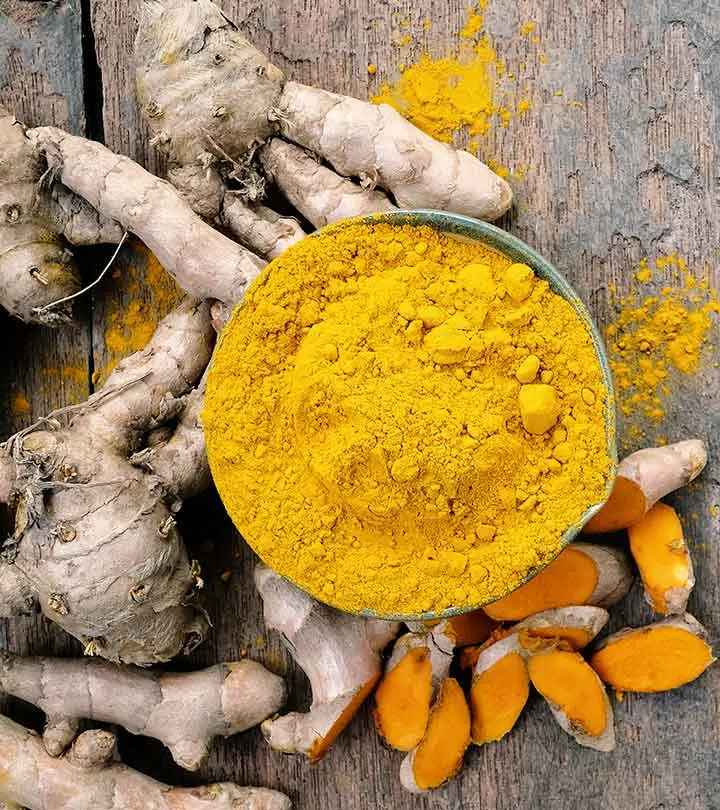
Image: Shutterstock
Bouts of sneezing, cough, and stuffy and irritated nose may indicate allergic reactions and can be pretty annoying. However, you will be surprised to know that using turmeric for allergies is quite effective and may help you manage the symptoms.
Turmeric contains curcumin, a potent anti-inflammatory compound that helps manage allergic symptoms and minimize inflammation. While the treatment for allergic reactions depends on your condition’s severity, you may rely on turmeric to manage mild symptoms. This article digs deeper into the efficacy of turmeric for allergies, how it works, and ways to use it. Read on.
In This Article
How Is Turmeric Good For Allergies?
- It Can Help Treat Asthma Allergies Curcumin, the polyphenolic phytochemicali Chemical compounds naturally occurring in plants that possess various nutritional and medicinal properties. in turmeric, can modulate your immune system and prevent the release of histamine (a compound that triggers inflammatory response and itching) from your mast cells (1).
- It Can Help Treat Allergic Rhinitisi An inflammation of the inside of the nose caused by an allergen and shows symptoms like sneezing, and a runny nose. Curcumin can help alleviate nasal congestion, sneezing, and congestion, and other symptoms of allergic rhinitis. In a study done on 241 patients with perennial allergic rhinitis, curcumin was found to improve nasal airflow in a period of two months (2).
- It Helps Reduce Itching
A mice study showed topical curcumin to be an excellent anti-itching agent. It could reduce itching triggered by histamine release. Curcumin blocked TRPV1 (the capsaicin receptor) in the sensory neurons of mice. TRPV1 receptors are responsible for the painful and burning sensations (3).
Both topical applications and oral intake of turmeric can keep your skin healthy. The spice has anti-inflammatory and antimicrobial properties. It helps manage a number of skin conditions, including acne, atopic dermatitisi Commonly known as eczema, it is a skin condition characterized by an itchy, red rash often triggered through contact with allergens. , psoriasis, alopecia, and vitiligoi An autoimmune pigmentary disorder that destroys melanocytes in specific areas of the body resulting in loss of skin color. ( 4).
 Trivia
TriviaHere are the ways you can use turmeric to help treat allergies.
Key Takeaways
- Turmeric has anti-inflammatory qualities and prevents puffiness of the skin.
- You can use turmeric in various dishes, even tea.
- Take medical advice before using turmeric.
- Stop using it if you develop skin irritation.
- If you are using turmeric topically, then limit your sun exposure.
How To Use Turmeric For Treating Allergies
For Consumption
Ensure you consume the right amount of turmeric, and not too much of it. According to the World Health Organization (WHO), the acceptable daily intake of curcuminoids (a phenolic compound present in turmeric) should be within the range of 0-3 mg per kilogram of body weight (5). You can adjust the dosage accordingly after consulting your doctor.
1. Turmeric Powder
Turmeric contains a compound called curcumin, which is a powerful antioxidant.
Curcumin also has anti-allergic properties and inhibits the release of histaminesi A chemical released by WBCs in case of a pathogen invasion that triggers symptoms like itching, inflammation, and rash. .
You Will Need
Method
Add turmeric powder to curries, fries, milk, salads, etc.
How Often?
You can consume turmeric at every meal; just be wary about the quantity.
2. Turmeric Milk

Milk is good for health (although it has nothing to do with your allergy). If you are lactose intolerant, however, you can go with coconut or almond milk. A high dose of honey can help you with the symptoms of allergic rhinitis (AR) (6).
Cinnamon contains cinnamaldehyde, which is an anti-inflammatory agent (7). lack pepper contains piperine, which enhances the absorption of curcumin by 2000% (8). Ginger contains 6-gingerol, which, in a study, could help alleviate the symptoms of allergic rhinitis in mice (9). Cayenne pepper adds to the flavor of the concoction.
You Will Need
- 1/2 teaspoon of turmeric powder
- 1 cup of full-fat milk (you may use coconut or almond milk)
- 1 teaspoon of raw honey
- A pinch of cinnamon powder
- A pinch of ground black pepper
- A small piece of ginger
- A pinch of cayenne pepper
Method
- Pour the milk into a saucepan and heat it slightly.
- Add all the ingredients.
- Whisk until everything is dissolved. Ensure that it does not boil.
- Pour into a mug and consume.
How Often?
One glass a day, before going to bed.
Note: Raw honey often contains grains of pollen that may cause an allergic reaction. If you are allergic to pollen, avoid using raw honey. Regular or processed honey doesn’t contain any pollen. However, it may not be as effective as raw honey.
Jayashree Subramanian, a blogger, shared her personal experience and how she likes to create a simple recipe for turmeric milk in her blog post. She states, “Whenever my brother or I had a sore throat or had the slightest signs of cough, our Pati made us the manja-podi paal (literally translates to turmeric milk) (i).” She then proceeds to talk about the recipe and states the instructions, “Pour milk in a saucepan, add turmeric powder or crushed fresh turmeric and ground black pepper and bring to a boil.”
3. Turmeric Tea
The benefits of turmeric tea made with honey include treating sneezing, a runny nose, and other symptoms of allergic rhinitis (6). The turmeric in the mixture can further help improve the allergic symptoms. However, avoid raw honey if you are allergic to pollen.
You Will Need
- 1/2 teaspoon of turmeric powder
- 1/2 teaspoon of honey
- 1 cup of water
Method
- Heat the water and add the turmeric powder to it. Stir well.
- Add the honey, stir, and consume.
How Often?
Twice a day.
4. Turmeric Water

The curcumin in turmeric has anti-allergic properties that inhibit histamine release and reduce allergy symptoms.
You Will Need
- 1/2 teaspoon of turmeric
- A glass of water
Method
- Add the turmeric powder to the water.
- Stir well and drink it.
How Often?
At least once a day.
 Quick Tip
Quick Tip5. Turmeric With Apple Cider Vinegar And Honey
Lemon contains vitamin C, which effectively blocks histamine release in the body. A study found that consuming vitamin C reduces the symptoms of allergic rhinitis (10). ACV is touted as a natural remedy for allergic reactions (though there is no evidence to support this statement). Honey helps in easing the symptoms of allergic rhinitis (6). Black pepper contains piperine that enhances the absorption of curcumin, the major component of turmeric that combats allergies (8).
You Will Need
- 1 tablespoon of ground turmeric
- 1 teaspoon of lemon zest
- 2 tablespoons of raw apple cider vinegar
- 1/4 cup of honey
- 1/4 tablespoon of black pepper
- Mortar and pestle
Method
- Using the mortar and pestle, grind the turmeric to make a fine powder.
- Add the honey, lemon zest, apple cider vinegar, and black pepper to the powder.
- Mix well.
How Often?
Have a tablespoon of the mixture every day. Store the rest of the mixture in an airtight container and keep it refrigerated. It should last for about a week.
6. Turmeric With Lemon And Honey

This smoothie could especially be used to treat sinus allergies or allergic sinusitis. Lemon juice contains vitamin C, which helps block histamine release (10). Raw honey has propolisi A natural resin-like substance produced by honeybees that is said to have powerful antibacterial and anti-inflammatory properties. , which boosts the immune system (11). Cayenne pepper is believed to reduce nasal congestion and stuffiness; however, more research is warranted in this aspect.
You Will Need
- 2 medium pieces of turmeric root
- 1 lemon
- 1 teaspoon of honey
- Water
- A pinch of cayenne pepper
- A banana (optional)
Method
- Blend the turmeric roots to make a paste.
- Add freshly squeezed lemon to it.
- Add honey, cayenne pepper, and water.
- Stir well to make a turmeric smoothie.
- You can also add a banana for taste.
How Often?
Once a day, whenever you want. You can replace your breakfast with this smoothie.
7. Turmeric With Olive Oil And Water
Natural plant polyphenols are said to have anti-allergic properties. Olive oil is rich in these polyphenols that may help relieve allergic symptoms. Moreover, it is also rich in antioxidants that could help boost your immune system (12). Both black pepper and turmeric help in soothing allergic symptoms.
You Will Need
- 1 teaspoon of turmeric powder
- 1/4 teaspoon of olive oil
- A pinch of black pepper powder
- A glass of water
Method
- Add the turmeric powder and olive oil to water.
- Add the black pepper powder to the mixture.
- Stir the ingredients together.
How Often?
Consuming this once daily will help you get relief from seasonal allergies.
8. Turmeric With Yogurt
Yogurt is rich in probiotic content, which improves gut health, helps balance the immune system, and reduces allergic reactions (13). Combining these probiotic benefits with turmeric’s natural anti-inflammatory compounds may work better to lower inflammation and ease allergy symptoms.
You Will Need
- 1 teaspoon of turmeric powder
- 1 cup of plain yogurt
Method
- Mix the turmeric powder with the yogurt.
- Stir well until it is evenly combined.
- Drink it with your meal or after.
How Often?
Consume this once daily to help reduce allergy symptoms
For Topical Application
9. Turmeric Juice With Honey
Honey has anti-inflammatory properties and could help soothe the affected areas (14). Turmeric has antibacterial and anti-inflammatory properties (4). These may help combat rashes.
- 1 teaspoon of turmeric juice
- 2 tablespoons of honey
Method
- Mix the juice and honey.
- Slather it on the affected areas.
- Keep it on for half an hour.
- Wash it off.
How Often
Once a day, before taking a bath.
10. Turmeric Paste
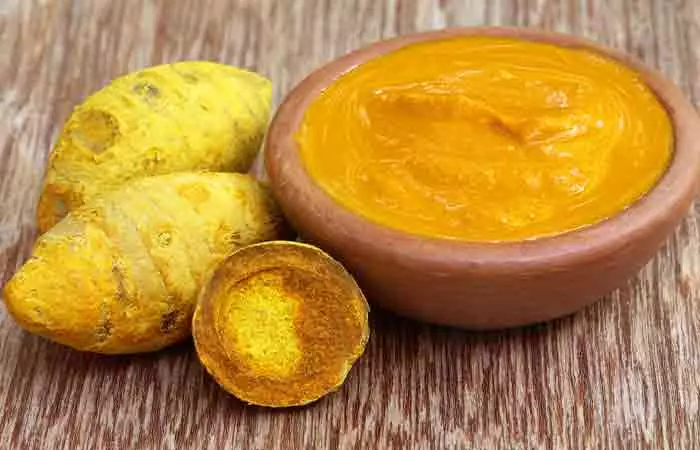
Chilled milk (or chilled water) may feel soothing on your skin. The anti-inflammatory properties of turmeric can further soothe the skin allergy and promote skin health (4).
You Will Need
- 1/2 teaspoon of turmeric
- A few drops of chilled milk (or water)
Method
- Mix the turmeric and milk to form a paste.
- Apply it to the affected areas. Leave it on for 20 minutes.
- Rinse with warm water and pat dry.
How Often
Once a day, before taking a bath.
11. Turmeric With Sandalwood Paste

Sandalwood oil has antiseptic, astringent, and anti-inflammatory, properties that could help alleviate skin issues (15). Hence, the sandalwood powder may also have similar effects and could help calm allergic skin reactions along with turmeric. However, there is no direct research to establish these effects.
You Will Need
- 1 teaspoon of turmeric powder
- 1 teaspoon of red sandalwood
- Lukewarm water
Method
- Mix equal quantities of red sandalwood and turmeric powder with water to make a paste.
- Apply the paste to the affected areas.
- Let it stay for about half an hour.
- Rinse with lukewarm water.
How Often
Twice a day.
12. Turmeric With Baking Soda
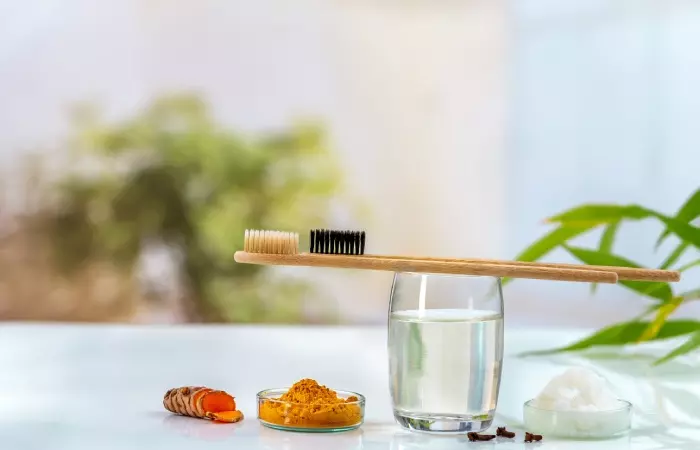
The curcumin in turmeric has anti-inflammatory and antioxidant properties that may help reduce swelling (16). Baking soda, on the other hand, may reduce itchiness and irritation (17). Using this remedy may help reduce the symptoms of allergic reactions to some extent. However, more research is required to prove the efficacy of this remedy.
You Will Need
- 2 teaspoons of turmeric powder
- 2 teaspoons of baking soda
- ½ -1 teaspoon of water
Method
- Mix the turmeric and baking soda in a small bowl.
- Add water and mix well to get a thick paste.
- Apply the paste to the affected area and leave it on for 10-15 minutes.
- Rinse it off gently with lukewarm water and pat dry.
How Often
Twice a day.
When trying these remedies it is important to follow a few precautions to avoid any side effects of turmeric. Check out the next section to know more.
Precautions To Follow While Using Turmeric For Treating Allergies
Curcumin is a contact allergen (18). Although it has therapeutic and skin benefits, it might cause allergic reactions. Hence, before using turmeric, you need to ascertain a few things:
- Find out if you are allergic to turmeric (curcumin, to be specific). If yes, avoid turmeric altogether.
- Never use or consume more than the prescribed amount of turmeric. Anything excess is not good for health. Stick to the measurements.
- If you are taking curcumin supplements, never self-medicate. Talk to a doctor or a nutritionist and follow their advice on supplements.
- If you are pregnant or lactating, be careful with turmeric intake. Consult a doctor to ensure safety.
- When applying turmeric, be wary of the possible stains. It might leave stains on your clothes and your skin. These are not harmful usually and can be washed away.
- Oral consumption of turmeric may cause nausea, dizziness, and diarrhea in some people (if you are allergic to turmeric). Hence, exercise caution.
- Never intake a large dosage of turmeric. It is said to cause abnormal heart rhythm although the reason behind it is still unknown.
- If you have gallbladder issues, turmeric might worsen it.
- If you have undergone any surgery, avoid turmeric as it might slow down the blood clotting process (19).
- Talk to your doctor before starting any new treatment, especially if you have health issues or are on medication.
Infographic: 6 Ways To Use Turmeric For An Allergy
Turmeric is an ancient herb used in many alternative medicines for its healing properties. It is beneficial for your skin as well as your overall health. An interesting benefit is that it can help treat certain allergies. Check out the infographic below to learn how to use turmeric to treat your allergy.

Illustration: StyleCraze Design Team
Turmeric is a spice known for its anti-inflammatory and antimicrobial properties. Amonf the many turmeric benefits, its ability to manage allergies and the associated symptoms is well-known. It contains curcumin that may help minimize inflammation. This polyphenolic phytochemical may help treat asthma allergies and rhinitis and reduce itching. It can be used in the form of powder, milk, tea, and water – alone or with other ingredients. However, oral consumption of turmeric may cause diarrhea, nausea, and dizziness. Hence, use it in moderation and consult your doctor in case of emergencies.
Frequently Asked Questions
Can turmeric supplements cause an allergic reaction?
Yes, they can.
How much turmeric do you have to take for treating allergies?
As suggested by the doctor or between 0-3 mg/kg every day.
How long does it take for turmeric to work?
The results can vary from person to person. You may generally notice improvements in around 4-8 weeks.
Can I take turmeric and vitamin D together?
Yes, you may take both together. The curcumin in turmeric interacts with vitamin D receptors and significantly improves vitamin D levels in the body(18). However, consult a doctor before taking any supplements.
Can turmeric make eczema worse?
No. The antimicrobial and anti-inflammatory properties of turmeric help manage eczema symptoms (19).
Illustration: Turmeric for Allergies – How To Use Dosage and Warning

Image: Stable Diffusion/StyleCraze Design Team
Personal Experience: Source
StyleCraze's articles are interwoven with authentic personal narratives that provide depth and resonance to our content. Below are the sources of the personal accounts referenced in this article.
i. Turmeric milk/ Manja podi paalhttps://thevanillabeanstalk.wordpress.com/2017/11/19/turmeric-milk-manja-podi-paal/
References
Articles on StyleCraze are backed by verified information from peer-reviewed and academic research papers, reputed organizations, research institutions, and medical associations to ensure accuracy and relevance. Read our editorial policy to learn more.
- Immunomodulatory effects of curcumin in allergy., Molecular Nutrition And Food Research, US National Library of Medicine, National Institutes of Health.
https://pubmed.ncbi.nlm.nih.gov/18398870/ - Effect of curcumin on nasal symptoms and airflow in patients with perennial allergic rhinitis., Annals of Allergy, Asthma, and Immunology, US National Library of Medicine, National Institutes of Health.
https://pubmed.ncbi.nlm.nih.gov/27789120/ - Antipruritic effect of curcumin on histamine-induced itching in mice, Korean Journal of Physiology & Pharmacology, US National Library of Medicine, National Institutes of Health.
https://www.ncbi.nlm.nih.gov/pmc/articles/PMC6115343/ - Effects of Turmeric (Curcuma longa) on Skin Health: A Systematic Review of the Clinical Evidence. Phytotherapy Research, US National Library of Medicine, National Institutes of Health.
https://pubmed.ncbi.nlm.nih.gov/27213821/ - Biological activities of curcuminoids, other biomolecules from turmeric and their derivatives – A review, Journal of Traditional and Complementary Medicine, US National Library of Medicine, National Institutes of Health.
https://www.ncbi.nlm.nih.gov/pmc/articles/PMC5388087/ - Ingestion of honey improves the symptoms of allergic rhinitis: evidence from a randomized placebo-controlled trial in the East coast of Peninsular Malaysia., Annals of Saudi Medicine, US National Library of Medicine, National Institutes of Health.
https://pubmed.ncbi.nlm.nih.gov/24188941/ - Cinnamon: A Multifaceted Medicinal Plant, Evidence-based Complementary and Alternative Medicine, US National Library of Medicine, National Institutes of Health.
https://www.ncbi.nlm.nih.gov/pmc/articles/PMC4003790/ - Influence of piperine on the pharmacokinetics of curcumin in animals and human volunteers., Planta Medica, US National Library of Medicine, National Institutes of Health.
https://pubmed.ncbi.nlm.nih.gov/9619120/ - Prevention of allergic rhinitis by ginger and the molecular basis of immunosuppression by 6-gingerol through T cell inactivation. Journal of Nutritional Biochemistry, US National Library of Medicine, National Institutes of Health.
https://pubmed.ncbi.nlm.nih.gov/26403321/ - Association of Antioxidants With Allergic Rhinitis in Children From Seoul, Allergy, Asthma & Immunology Research, US National Library of Medicine, National Institutes of Health.
https://www.ncbi.nlm.nih.gov/pmc/articles/PMC3579096/ - Honey, Propolis, and Royal Jelly: A Comprehensive Review of Their Biological Actions and Health Benefits, Oxidative Medicine, and Cellular Longevity, US National Library of Medicine, National Institutes of Health.
https://www.ncbi.nlm.nih.gov/pmc/articles/PMC5549483/ - Potential Health Benefits of Olive Oil and Plant Polyphenols, US National Library of Medicine, National Institutes of Health.
https://www.ncbi.nlm.nih.gov/pmc/articles/PMC5877547/ - Crude Turmeric Extract Improves the Suppressive Effects of Lactobacillus rhamnosus GG on Allergic Inflammation in a Murine Model of House Dust Mite-Induced Asthma
https://www.frontiersin.org/journals/immunology/articles/10.3389/fimmu.2020.01092/full - Honey and its Anti-Inflammatory, Anti-Bacterial and Anti-Oxidant
Properties, General Medicine: Open Access.
https://www.iomcworld.com/open-access/honey-and-its-anti-inflammatory-anti-bacterial-and-anti-oxidant-2327-5146.1000132.pdf - East Indian Sandalwood Oil (EISO) Alleviates Inflammatory and Proliferative Pathologies of Psoriasis, Frontiers in Pharmacology, US National Library of Medicine, National Institutes of Health.
https://www.ncbi.nlm.nih.gov/pmc/articles/PMC5352686/ - Impacts of turmeric and its principal bioactive curcumin on human health: Pharmaceutical, medicinal, and food applications: A comprehensive review, Frontiers in Nutrition, US National Library of Medicine, National Institutes of Health.
https://www.ncbi.nlm.nih.gov/pmc/articles/PMC9881416/ - Old fashioned sodium bicarbonate baths for the treatment of psoriasis in the era of futuristic biologics: an old ally to be rescued, Journal of Dermatological Treatment, US National Library of Medicine, National Institutes of Health.
https://pubmed.ncbi.nlm.nih.gov/15897164/ - Effects of curcumin supplementation on vitamin D levels in women with premenstrual syndrome and dysmenorrhea: a randomized controlled study, US National Library of Medicine, National Institutes of Health.
https://www.ncbi.nlm.nih.gov/pmc/articles/PMC8784001/ - Potential of Curcumin in Skin Disorders, US National Library of Medicine, National Institutes of Health.
https://www.ncbi.nlm.nih.gov/pmc/articles/PMC6770633/
Explore the natural healing powers of turmeric as a home remedy for cough, cold, and seasonal allergies. Watch this insightful video to uncover the benefits and learn how to use turmeric effectively.
Read full bio of Dr. Zeel Gandhi
Read full bio of Ramona Sinha
Read full bio of Anjali Sayee
Read full bio of Shiboli Chakraborti






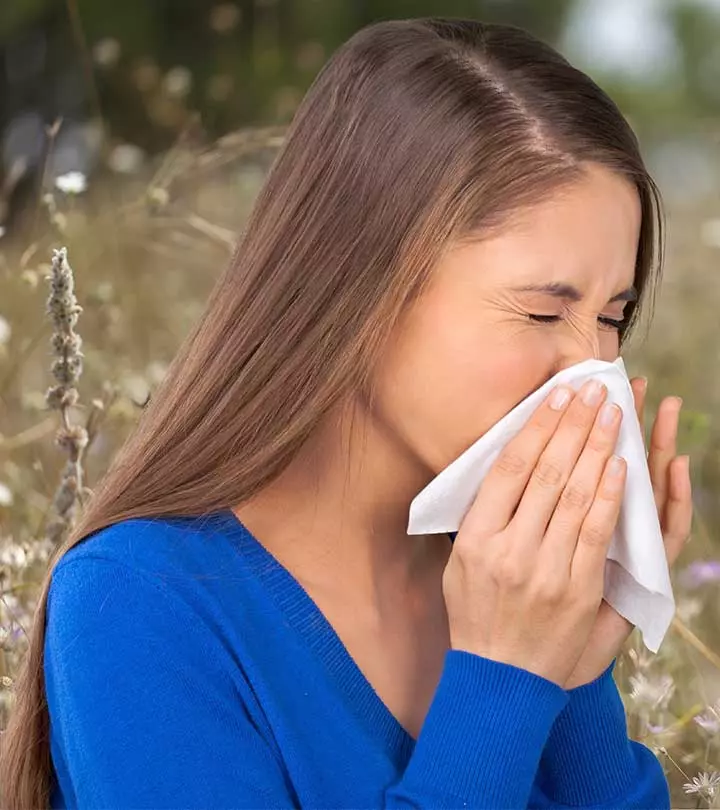



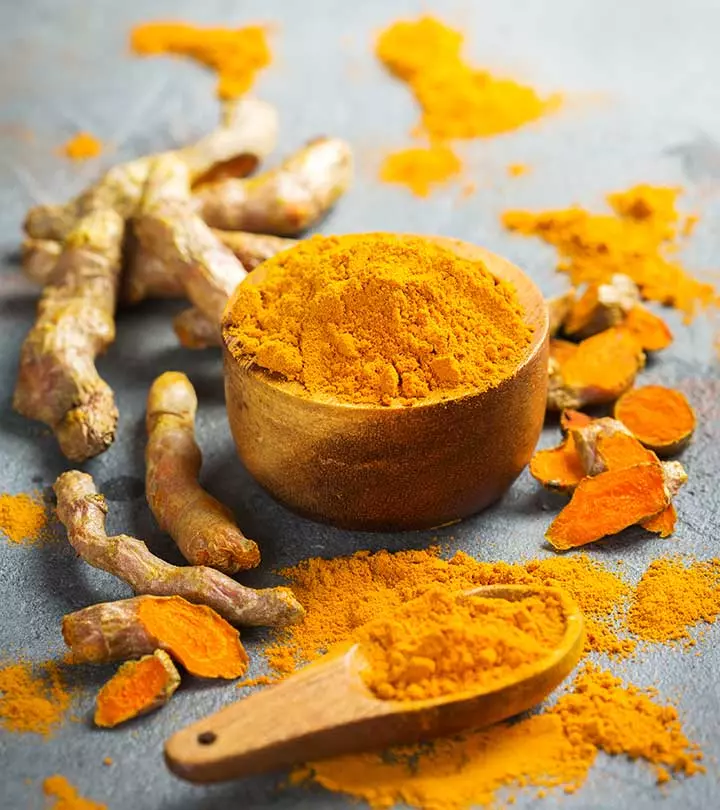
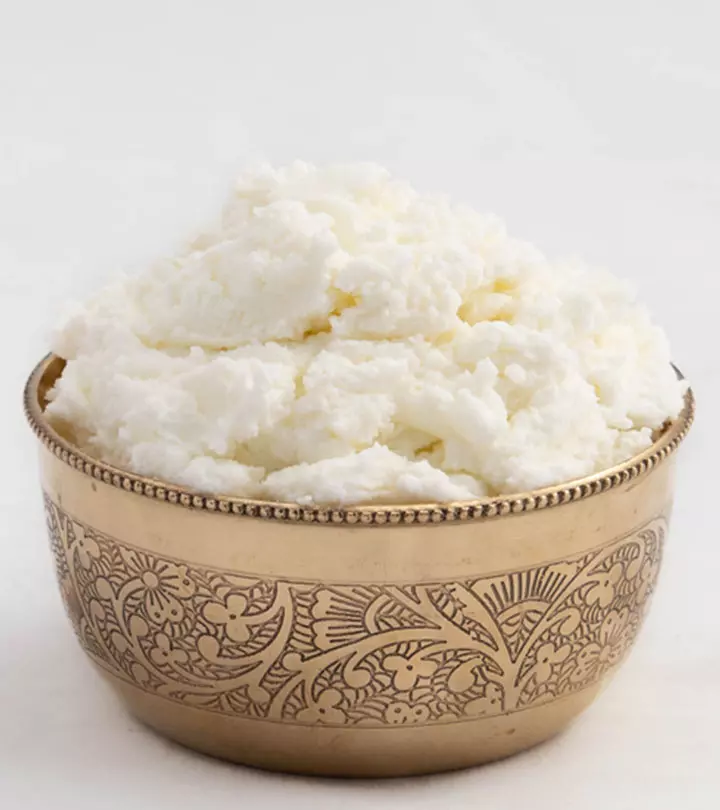
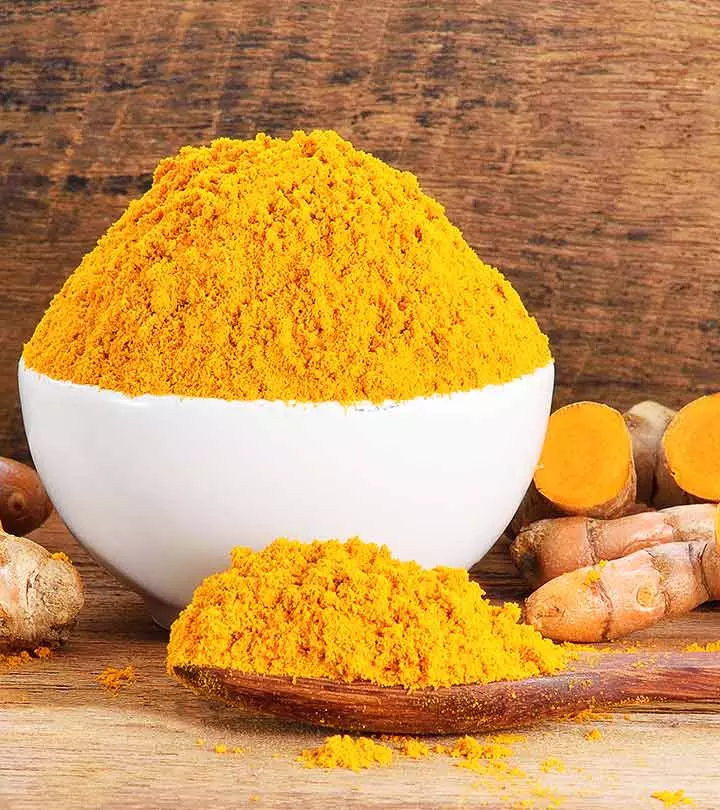














Community Experiences
Join the conversation and become a part of our empowering community! Share your stories, experiences, and insights to connect with other beauty, lifestyle, and health enthusiasts.